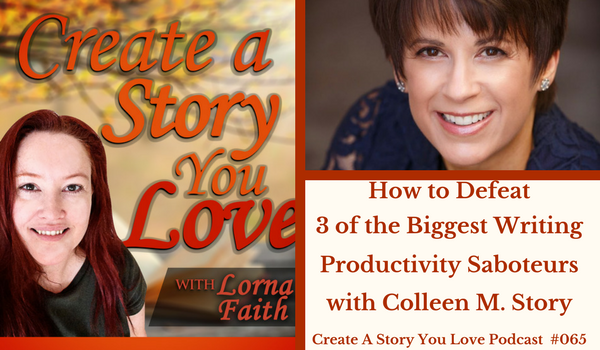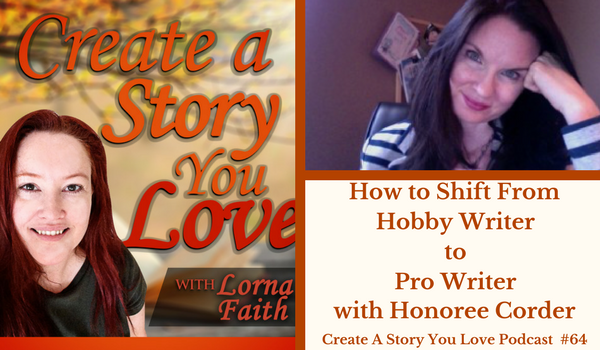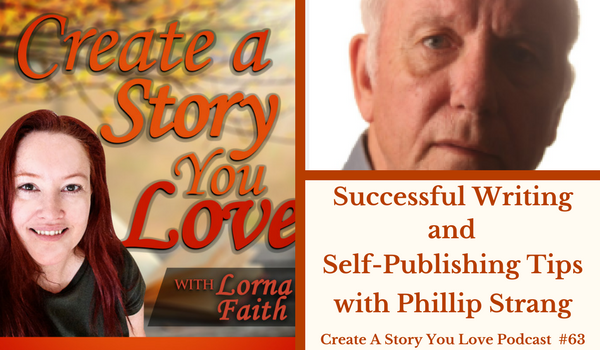Podcast: Play in new window | Download
In today’s interview, nonfiction and fiction author Colleen M. Story, shares key insights that will help writers defeat the 3 biggest writing productivity saboteurs.
Colleen gives practical tips and strategies to help writers identify what has been holding them back from reaching their goals and she gives tips on how to get around the 3 biggest writing saboteurs. You can connect with Colleen on Twitter or LinkedIn.
 In the intro, I share about the new shift that I’ve decided to make in my author business. I’ve really needed to create space for writing and so sometimes that means sacrificing doing those things that we love. For me, that means I’ll be putting the podcast on pause for at least a few months and maybe longer. I love talking with all these amazing authors and I’ve learned so much from them, but I feel like it’s time for me to write all those stories I’ve been dreaming of writing. I want to encourage you, that if there is something you are super passionate about – that you haven’t committed time for – take a deeper look at your life and write down your big dreams and goals and begin to get started to achieving that dream 🙂
In the intro, I share about the new shift that I’ve decided to make in my author business. I’ve really needed to create space for writing and so sometimes that means sacrificing doing those things that we love. For me, that means I’ll be putting the podcast on pause for at least a few months and maybe longer. I love talking with all these amazing authors and I’ve learned so much from them, but I feel like it’s time for me to write all those stories I’ve been dreaming of writing. I want to encourage you, that if there is something you are super passionate about – that you haven’t committed time for – take a deeper look at your life and write down your big dreams and goals and begin to get started to achieving that dream 🙂
3 Books I’ve been reading lately that might be useful for you too…
1.Overwhelmed Writer Rescue: Boost Productivity, Improve Time Management and Replenish the Creator Within, by Colleen M. Story. This book will help you shift free from self-doubt, procrastination and distractions to help you focus on your most important task… writing.
2.I’ve also been reading Dean Wesley Smith’s book titled, Killing the Top 10 Sacred Cows of Indie Publishing. Reading this book, has dispelled a few myths that I believed about being an indie author… it might do the same for you!
3.A short ebook to help romance writers, written by Mark Dawson and Serenity Woods called, Top Ten Tips for Topping the Romance Charts. If you’re a romance writer, or want to write romance, this short ebook will help you understand how to write romance to attract your readers and then how to develop your brand 🙂
Listen to the Video Interview
 Colleen M. Story is an imaginative fiction writer and full-time freelance writer living in the great Northwest. She is on a mission to inspire people from all walks of life to overcome modern-day challenges and find creative fulfillment.
Colleen M. Story is an imaginative fiction writer and full-time freelance writer living in the great Northwest. She is on a mission to inspire people from all walks of life to overcome modern-day challenges and find creative fulfillment.
With over 20 years as a professional in the creative industry, Colleen has authored thousands of articles for publications like “Healthline” and “Women’s Health;” worked with high-profile clients like Gerber Baby Products and Kellogg’s; and ghostwritten books on back pain, nutrition, and cancer recovery. Her literary novel, Loreena’s Gift, was a Foreword Reviews’ INDIES Book of the Year Awards winner, an Idaho Author Awards first place winner, and New Apple Solo Medalist winner, among others. You can find her inspiring and motivational blogposts over at writingandwellness.com.
In this interview, Colleen shares how many times as writers, our minds mess with us and cause us to delay, procrastinate and hinder our creative time to stop us from reaching the goals we’ve set for ourselves.
If you’ve struggled with procrastination or delayed finishing your book, listen to Colleen’s tips on how you can get around productivity saboteurs like perfectionism; workaholism and self-doubt.
Waiting creates fear. Action builds confidence. @colleen_m_story Share on XInterview Highlights:
*Tips on how to learn to listen to and serve your readers.
*An overview of 7 writing saboteurs that apply to writers and creatives: writer’s guilt; dis-ease(too tired); self-doubt; perfectionism; workaholism; destructive goal setting; belief.
*Thoughts on how self-doubt tag-teams with perfectionism to cause you to delay and procrastinate on your writing goals.
3 Biggest Writing Productivity Saboteurs:
1.Questions to ask yourself to discover if you’re being sabotaged by perfectionism: are you hard on yourself when things go wrong; do you spend more time when you work on a task because you want it to be done just right?
Problem: scientists have found that perfectionists are less productive and that because they fear failure, they procrastinate.
Solution: Set priorities in your life. I’ll do my most important task first before I do anything else. Then I’ll minimize my time on social media and email. It also helps to focus on productivity, and lower my expectations which helps you relax.
2.Questions to ask yourself to find out if you’re being sabotaged by workaholism: do you feel guilty when you are relaxing or taking a few days off? Think about how you were raised – were you raised in a family where hard work was valued over everything else? Hard work is a good thing to learn, but does that become the priority over everything… even writing?
Problem: If you have workaholism you end up with “get-done-itis” – which means that you might sacrifice your well being to get things done. Scientists have found the when people who are older than 35 years working more than 25 hours a week could cause a negative impact on mental functioning.
Solution: ask yourself what am I really getting for working so many hours? Ask what are you getting in return for this hard work and is it worth not being able to invest in your writing. Ask yourself where do you want to be in 5 or 10 years? Keep a journal to track your time for 30 days and see what you can get rid of to make more time for writing. Take a one or two day retreat to reflect and think about your life and what needs to shift.
3.Questions to ask yourself to uncover if you’re being sabotaged by self-doubt: when you get a rejection or someone doesn’t like your work, do you feel like a total failure and/or feel like you should just quit writing? Do you often sacrifice your creative time for others who ask you to do things for them? Do you secretly you’re not as good or talented as others think you are? Do you still worry that others will discover the “truth” that you really aren’t talented? Side note: pretty much all writers deal with at least one of these challenges.
Problem: If you’re making excuses not to write, that this can be in the unconscious mind and you might not realize this is happening. Example: if you’re putting other people’s goals before your own, then your writing hardly ever gets done.(Lorna: I struggle with this one big time… in the process of changing that now). Self-doubt keeps you held down from believing you can make money with your writing or why you don’t have time to do this.
Solution: Recognize the trigger. If you’re getting any of the above thoughts, you have to realize what triggers those thoughts to come on. Example: maybe you’re struggling with a spot in your novel. Instead of seeing it as a typical problem spot that all novelists go through, maybe that thought of: man this novel isn’t coming together like it’s supposed to maybe there is something wrong with it. Recognize that trigger… that you have a habitual response. Self-doubt is a HABIT. All you have to do is Break that habit. Break the habit by taking an immediate action of some kind. The second you take action, it will help you build your confidence.
Overall takeaway to get around these writing saboteurs…
We have to get to know ourselves better as creatives. It’s important to take writing seriously so we can reach our goals.
Ask yourself, what is it about my habits or the way I’m approaching writing that’s holding me back?
Many times the problem is that we are often looking outside of ourselves, which is something we can’t change. All we can do is change what we are doing. Ask yourself: what habits do I have or what beliefs do I have that are holding me back? How can I adjust this?
To change your approach to writing so that you become more productive…
1.Believe in yourself more.
2.Be willing to invest in yourself.
3.Be willing to change some of your everyday working habits to fit that writing in. To make sure that the writing will happen everyday no matter what.
“If you honour that voice inside of you that says it’s time to write, you grow more as a writer and as a person.” Colleen M. Story
To find out more of what Colleen is up to, check out her website or connect with Colleen on Twitter or LinkedIn.












